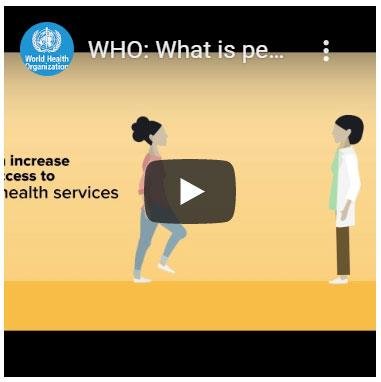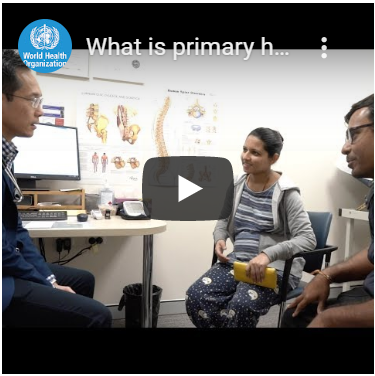Primary health care
All people, everywhere, deserve the right care, right in their community. This is the fundamental premise of primary health care.
Primary health care (PHC) addresses the majority of a person’s health needs throughout their lifetime. This includes physical, mental and social well-being and it is people-centred rather than disease-centred. PHC is a whole-of-society approach that includes health promotion, disease prevention, treatment, rehabilitation and palliative care.
A primary health care approach includes three components:
- meeting people’s health needs throughout their lives;
- addressing the broader determinants of health through multisectoral policy and action; and
- empowering individuals, families and communities to take charge of their own health.
By providing care in the community as well as care through the community, PHC addresses not only individual and family health needs, but also the broader issue of public health and the needs of defined populations.
The principles of PHC were first outlined in the Declaration of Alma-Ata in 1978, a seminal milestone in global health. Forty years later, global leaders ratified the Declaration of Astana at the Global Conference on Primary Health Care which took place in Astana, Kazakhstan in October 2018.
PHC, because it is about how best to provide health care and services to everyone, everywhere, is the most efficient and effective way to achieve health for all.
In 1978, leaders from around the world gathered in Alma-Ata, Kazakhstan, for what would prove to be a seminal moment in global health. The Declaration of Alma-Ata was the first to call for urgent and effective national and international action to develop and implement primary health care throughout the world.”
Forty years later, leaders and stakeholders representing government, the private sector, and civil society returned to Kazakhstan. The Global Conference on Primary Health Care, which took place in Astana in October 2018, reaffirmed primary health care as the most effective and efficient approach to achieve universal health coverage and the Sustainable Development Goals.
Based on a bold vision, the 2018 Declaration of Astana centers around 4 commitments:
1. Making bold political choices for health across all sectors;
2. Building sustainable primary health care – adapted to each country’s local context;
3. Empowering individuals and communities;
4. Aligning stakeholder support to national policies.
Taking into account 40 years of lessons learned since the original Declaration of Alma-Ata, the Declaration of Astana was developed through a multi-stakeholder process that included consultations with Member States, a group of international experts, civil society and the general public.
How can governments, health organizations, health care professionals and communities transform the bold vision of the Declaration of Astana into action?
The Operational framework for primary health care: transforming vision into action provides stakeholders with a series of levers to help countries and communities adopt a PHC approach and work to strengthen health systems as a way to achieve universal health coverage
- Operational framework for primary health care: English
- Operational framework for primary health care: Arabic
- Operational framework for primary health care: Chinese
- Operational framework for primary health care: French
- Operational framework for primary health care: Russian
- Operational framework for primary health care: Spanish
Core strategic levers
- Political commitment and leadership
- Governance and policy frameworks
- Funding and allocation of resources
- Engagement of community and other stakeholders
Operational levers
- Models of care
- Primary health care workforce
- Physical infrastructure
- Medicines and other health products
- Engagement with private sector providers
- Purchasing and payment systems
- Digital technologies for health
- Systems for improving the quality of care
- Primary health care-oriented research
- Monitoring and evaluation













